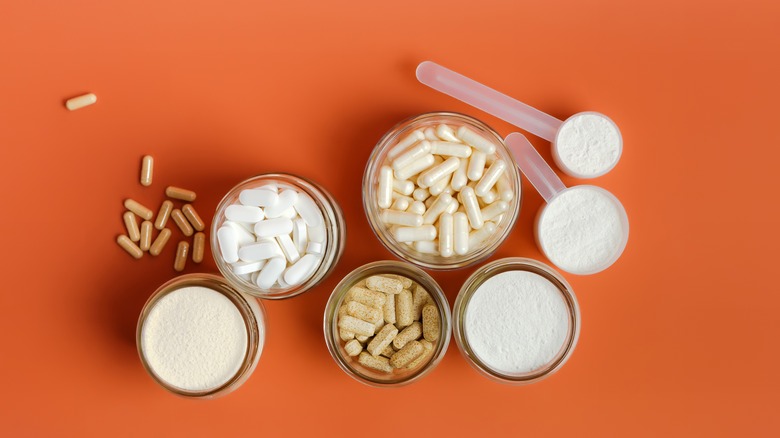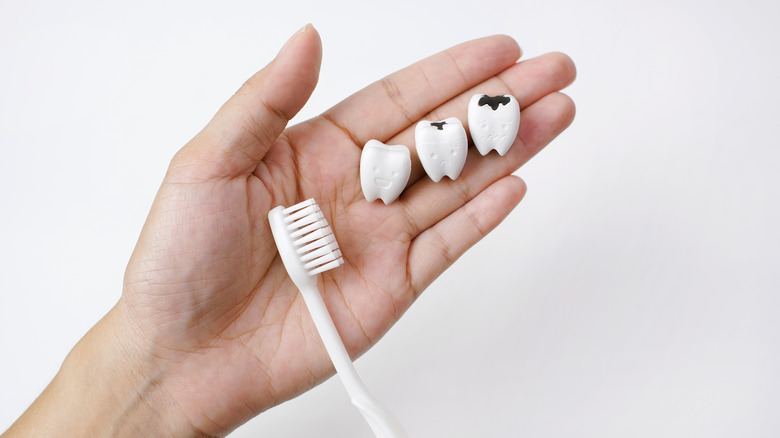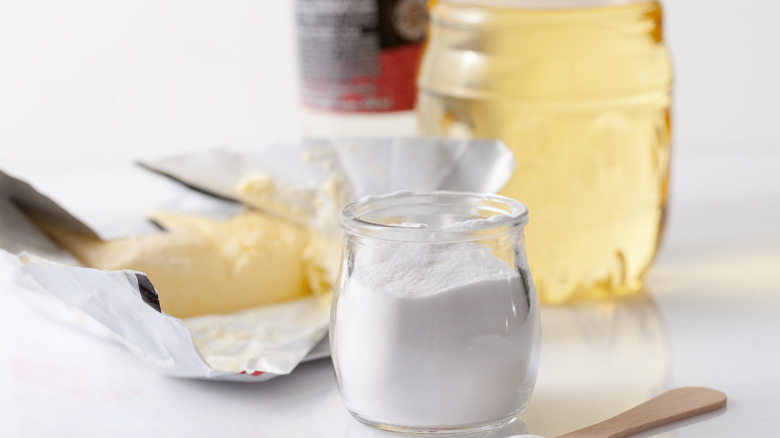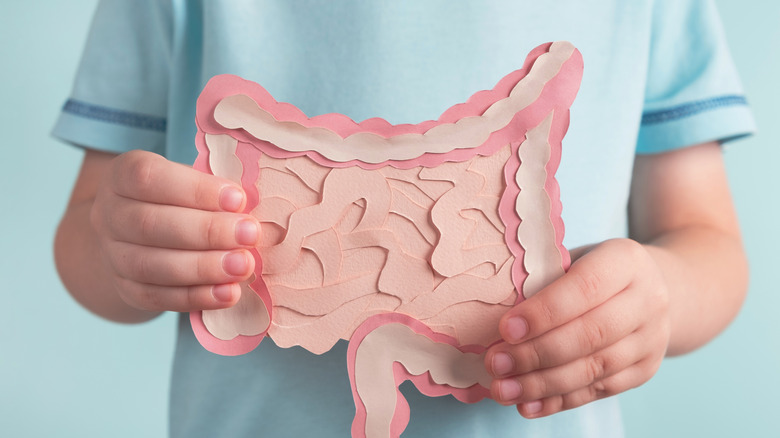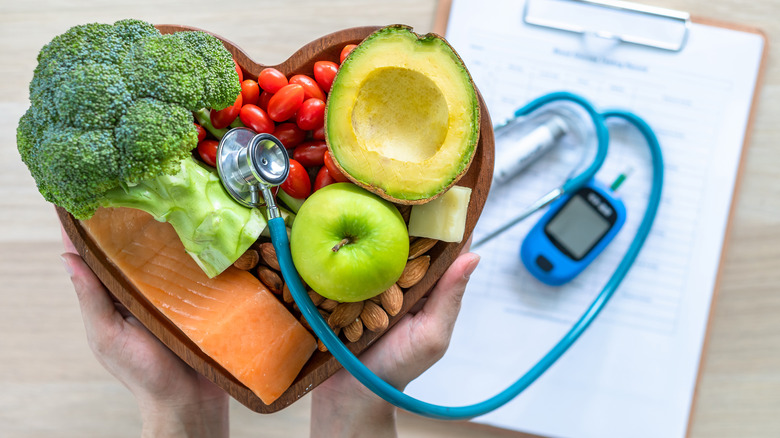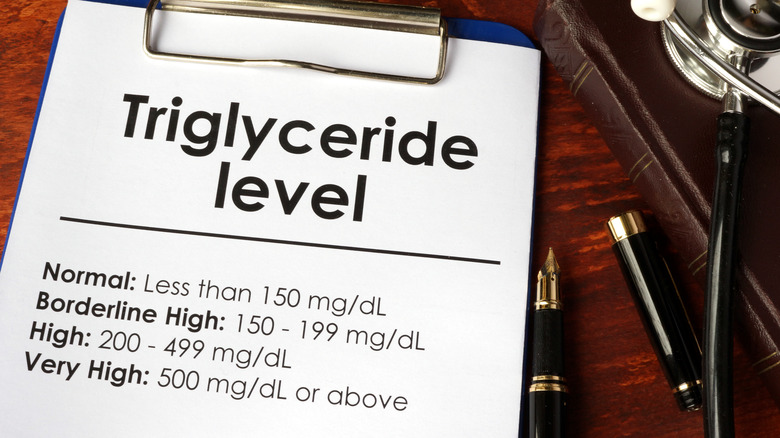When You Eat Butter Every Day This Is What Happens To Your Body
Whether you cook or bake with it, spread it, or melt it — butter can be a divisive topic. This dairy product has been back and forth on the "good" and "bad" foods lists for years.
Butter is made from churning cow's milk or cream, which separates the solid butterfat and liquid buttermilk, and the result is a firm, spreadable thing of bliss (via Taste of Home). It comes in salted and unsalted varieties and is considered by many a non-negotiable ingredient in baking.
You may be wondering why something so good could be so bad. It is up for debate depending on how much you consume. Experts say butter can be a part of a well-rounded diet — as long as it's consumed in moderation. While butter can cause some negative impacts to your health, it does bring some benefits to the table, too. Butter is a source of vitamins A, D, E, and calcium (via WebMD). One tablespoon has 102 calories, with 12 grams of fat — but no carbohydrates, fiber, sugar, or protein.
Curious what butter does to your body if you eat it every day? Read on to find out.
Your body gets nutritional fat
Contrary to what you may have heard, fat is not your ultimate health enemy. The "war against fats" studies date all the way back to the 1960s, according to the Harvard Public Health.
But your body actually needs healthy fats for energy, muscle movement, to absorb vitamins and minerals, as well as for blood clotting nutrients (via Harvard Health). That doesn't mean you should start consuming sticks of butter each day. Experts say saturated fats like those found in butter should be limited to less than 10% of your daily caloric intake.
The kicker is that when you try to eliminate fats from your diet, many times you replace the healthy fats with sugar or carbs that are even worse. And so reducing saturated fat didn't guarantee a healthier diet overall, explains Harvard Public Health.
"Saturated fat is found in a range of foods — including not only butter and meats but also milk, yogurt, cheese, nuts, and vegetable oils. Each of these foods has different effects on heart disease," Dariush Mozaffarian, dean of the Friedman School of Nutrition at Tufts University, told Harvard Public Health. "Instead of emphasizing one nutrient, we need to move to food-based recommendations. We're not going to artificially create healthy diets by manufacturing low-fat, low-saturated-fat packaged foods. What we eat should be whole, minimally processed, nutritious food — food that is in many cases as close to its natural form as possible."
Reduce body fat and weight
While saturated fats can negatively impact your health, there are other sources of fat in butter that could actually benefit you. The conjugated linoleic acid (CLA) found in butter, for example, could decrease body fat (via Healthline). You heard that right — butter could potentially help with weight loss.
How can that be? The fatty acids in butter are absorbed directly from the small intestine into the liver to be converted into energy (via Don't Waste the Crumbs). What actually is stored as fat in your body comes from refined carbohydrates and polyunsaturated oils, not necessarily saturated fats found in butter.
Some people also find butter to be a perk of a low-carbohydrate diet. Depending on your body type, you may be able to maintain your weight or have more weight loss success than with a low-fat diet (via WebMD). Another reason why butter could help with weight loss is because it may make you feel more full than its alternatives, according to Don't Waste the Crumbs. Feeling fuller means less room for poor food choices.
You get fat-soluble vitamins
You may be wondering what exactly fat-soluble vitamins are. Vitamins that are fat soluble are absorbed through fat and stored in the body, meaning they stick around longer than water-soluble vitamins that usually leave the body through the kidneys (via University of Michigan Health).
We need both fat-soluble and water-soluble vitamins in a balanced diet. Too much of fat-soluble vitamins can be toxic, while too much of specific water-soluble vitamins can also cause health issues. So how can you get your fat-soluble vitamins from food? Butter is a source of fat-soluble vitamins A or retinol, vitamin K, and vitamin E.
"Butter is America's best source of these important nutrients. In fact, vitamin A is more easily absorbed and utilized from butter than from other sources," according to the The Weston A. Price Foundation. "Fortunately, these fat-soluble vitamins are relatively stable and survive the pasteurization process."
The Weston A. Price Foundation adds that many people, specifically infants and growing children, benefit from having a higher-fat diet than a lower-fat diet.
You help prevent tooth decay
It may seem unlikely that a soft, rich and tasty spread like butter could have an impact on your teeth. But experts say that butter can actually help strengthen your teeth and prevent tooth decay.
The B12 in butter is considered a "periodontal disease-fighting vitamin" that can help heal those pesky canker sores and keep your gums healthy. In fact, gum disease like gingivitis or periodontitis in the worst cases can develop if you don't get enough vitamin B (via Burlingame Dental Arts). These diseases can cause tooth decay or even tooth loss.
This isn't a new finding. The potential dental perks of butter dates all the way back to the 1940s when researchers found that Vitamin K2 prevents tooth decay (via Don't Waste the Crumbs). But you shouldn't stop your oral hygiene routine of brushing and flossing to prevent tooth decay. Dentists at Burlingame Dental Arts also suggest opting for unsalted butter to keep other health issues related to sodium intake like cholesterol at bay.
You might lower your risk for cancer
Skeptical of a stick of butter and how it relates to potential anti-cancer properties? Butter is high in beta carotene, which could lower the risk of lung and prostate cancer (via WebMD). And grass-fed butter may be a solid option for upping your beta carotene intake. The founder of Bulletproof coffee tells the Kitchn that "one tablespoon of grass-fed butter has more beta carotenes than a bunch of carrots."
However, the research continues on butter's nutritional value and the connection with cancers. Among other health benefits, the conjugated linoleic acid (CLA) found in butter has also been linked to reducing breast, colon, colorectal, liver, prostate, and stomach cancers (via Healthline).
The Weston A. Price Foundation adds that the research on CLA levels is specific to pasture-fed cows, saying that it (CLA) disappears when cows are fed hay or feed. Stick with grass-fed butter to maximize this benefit.
Your skin may glow
You're reading this right — butter can give your body a healthy makeover from the inside out. Vitamins found in butter can boost your skin health — to the point that some people even use butter on their faces as a topical treatment. The vitamin E found in butter acts as a protector from UV ray damage (via WebMD). It also reduces inflammation on your skin, and can even affect the capability of your skin to heal your wounds.
And Vitamin A is a skin-booster thanks to the main form — retinol, which is found only in animal products like butter (via Martiderm). You have probably seen anti-aging facial creams, gels, or serums with retinol. That's because of its anti-wrinkling properties. Retinol also serves as a firming agent and gives your skin a glow via pigmentation development.
If you have suffered from acne, you may have even been treated with drugs that were derived from vitamin A. Vitamin A also helps keep your skin soft, as well as helping with healing.
Strengthen your bones
Like many dairy products, butter contains vitamin D. Vitamin D is key for bone health and development. It also maintains bone strength against diseases like osteoporosis, which is a weakening of your bones (via WebMD).
Vitamin K2 is specifically derived from animal products, and grass-fed butter is one of the best sources you can find. The Vitamin K in butter also serves as a bone-strengthener, similarly as it protects your teeth. Vitamin K2 tells your bones to absorb more calcium, promoting bone health. Researchers have found there is some success behind having more K2 in your diet, particularly with regard to bone and heart health. There is also a correlation between higher levels of vitamin K2 and lesser bone fractures (via Healthline).
Other vitamins and minerals found in butter, such as copper, manganese, and zinc also contribute to bone and joint health (via Euro-American Connections & Homecare). Consuming these vitamins and minerals can keep your arthritis or osteoporosis from getting worse.
Possibly reduce risk of diabetes
Some studies say that butter can even reduce the risk of getting type 2 diabetes. In fact, one study involving 600,000 people found that it may be protective against type 2 diabetes with a 4% reduced risk (via Time).
"In my mind, saturated fat is kind of neutral overall," Dr. Dariush Mozaffarian, dean of the Friedman School of Nutrition Science and Policy at Tufts and study author told Time. "Vegetable oils and fruits and nuts are healthier than butter, but on the other hand, low-fat turkey meat or a bagel or cornflakes or soda is worse for you than butter."
In another study, people who had higher levels of three byproducts found in full-fat dairy had a 46% lower risk of getting diabetes.
However, some are skeptical of butter being preventative or good for diabetics. The Diabetes Council says that while butter does not directly impact the blood glucose level like carbs will, there are other concerns. Butter does not need to be completely avoided, but should be limited, the council adds.
Improve digestive health
Another acid found in butter has proven it could be helpful for your stomach and digestive system. The short-chain fatty acid found in butter, butyrate, is also produced by your body to help you digest. Butyrate specifically helps your colon cells in the digestive process. It can decrease inflammation in your intestines and keep your electrolyte levels regular (via Healthline). Due to its anti-inflammatory properties, it is believed butyrate could even help treat stomach ailments like Crohn's disease.
Other fats in butter can also keep your digestive system in tip-top shape. The glycosphingolipids in butter can protect you from gastrointestinal infections (via Don't Waste the Crumbs).
"Short- and medium-chain saturated fatty acids have important antimicrobial properties," according to the The Weston A. Price Foundation. "They protect us against harmful microorganisms in the digestive tract."
Preventing infection in your gut is particularly helpful for at-risk populations like older people and children, according to Body Ecology.
Increase your calorie intake
It is possible to have too much of a good thing. One of the main issues with butter is that it is high in calories — roughly 102 calories in one tablespoon, similar to a medium banana (via Ochsner Health). While that doesn't seem like much, if you inadvertently overdo the serving size you could be looking at extra calories and extra weight over time.
"Theoretically, adding just one serving per day to your diet without making any other changes could lead to approximately 10 pounds (4.5 kilograms) of weight gain over the course of a year," according to Healthline.
Using butter in moderation can be okay, but choosing to use butter is troublesome for your health if you are already consuming a calorie-rich diet. High-calorie diets can be good for athletes or those who need to gain weight. Otherwise, you may experience an increased body fat percentage, an increased risk of diseases or certain cancers, and put your digestive system under heightened stress (via Livestrong).
Your cardiovascular health could be at risk
The overwhelming general belief for many years was that butter was bad due to its saturated fat content. Saturated fat makes up about 63% of total fat in butter, followed by the "good fats" — monounsaturated and polyunsaturated fat (via Healthline).
Recently, the tables have turned on whether or not saturated fat causes heart disease. "One meta-analysis of 21 studies said that there was not enough evidence to conclude that saturated fat increases the risk of heart disease, but that replacing saturated fat with polyunsaturated fat may indeed reduce risk of heart disease," according to Harvard Health.
While there may not be a direct link to saturated fat and cardiovascular issues, you could be making worse health decisions trying to avoid it. "People don't just remove saturated fat from their diets. They replace it with something else," Walter Willet, chair of the HSPH Department of Nutrition, told Harvard Public Health.
And it's not just butter that has saturated fat. It is also found in cheese, milk, nuts, vegetable oils, and yogurt.
Whether you're on the "yes" or "no" side of the argument, it is wise to limit your saturated fat if you have heart disease (via WebMD).
Increased cholesterol levels
A big reason why saturated fat is a no-no? It increases your body's total cholesterol — specifically the harmful low-density lipoprotein (LDL) cholesterol (via Harvard Public Health). It is important to note there are two types of cholesterol — "good" or high-density lipoprotein (HDL), and the bad LDL cholesterol.
You might not even notice that you have high cholesterol unless you are monitoring it. High cholesterol causes atherosclerosis — when the arteries harden or thicken. This condition can also result in chest pains, heart attack, kidney disease, peripheral arterial disease, or stroke (via Medical News Today).
If you are trying to lower your cholesterol, the American Heart Association recommends reducing saturated fats to less than 6% of your total daily caloric intake. This means opting for olive oil or non-hydrogenated vegetable oils instead of butter.
"Replacing all saturated fat in your diet with MUFAs [monounsaturated fats] and PUFAs [polyunsaturated fats] can lower bad cholesterol," preventive cardiology dietitian Julia Zumpano tells the Cleveland Clinic. "If you can't give up butter and don't have heart disease, make sure you aren't getting more than 10 to 15 grams of saturated fat per day."
You may also be prescribed medication to lower your cholesterol, but making nutritional or lifestyle changes can also make a difference.
Raise triglyceride levels
If you have ever had a bloodwork panel done, you probably have heard of triglycerides. These are fats (or lipids) found in your blood. Your body turns calories you don't need immediately into triglyclerides, which are stored in fat cells and released for energy in between meals (via the Mayo Clinic).
In fact, "Most of the fats we eat, including butter, margarines, and oils, are in triglyceride form," according to the Cleveland Clinic. Foods high in saturated fat like butter are known to raise triglycerides (via On Health).
So what happens when you have a high triglyceride level? You might start to experience arteriosclerosis and corresponding heart diseases like when you have high cholesterol, according to the Mayo Clinic. Pancreatitis — inflammation of the pancreas — is also a possibility.
Swapping out butter for healthier fats like olive oil or other alternative oils may keep your triglyceride levels at bay. Exercise, weight loss, avoiding sugar and refined carbs, and limiting your alcohol can also help with creeping triglyceride levels, according to the Cleveland Clinic.




